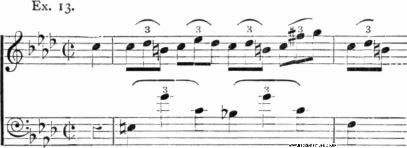MUSICAL MEMORY - online book
A System To Cultivate The Musical Memory For Musicians.
| Share page | Visit Us On FB |
|
MUSICAL MEMORY. 17 |
||
|
that is, we .ook at the keyboard and not at the music, in order that we may exercise an amount of visual control over the performance of them. (Chap. V).
32. In passages of the style described above, the chance of confusion arising with regard to the finger movements is slight, such, however, is not the case with irregular figures and passages which circle chiefly around a comparatively few and closely situated notes, keeping the hand in a contracted rather than in an extended condition. The employment of a large number of simple and similar movements occurring closely upon one another as in Chopin's Etude, Op. 25, No. 2 :— |
||
 |
||
|
admits of a greater possibility of confusion in reproducing them chiefly by the aid of muscular memory than when the series of movements are more strongly defined, and more widely separated. A condition which adds to the security of muscular memory in passages like the above-mentioned, is the ability to employ as many different fingers as possible, provided, of course, that the employment of them is in accordance with a good system of fingering. A series of movements starting, say, with the first finger, is less likely to become contused with the next series starting from the same finger if, between the two appearances of this finger, there are three of the other fingers employed instead of only one or two.
33. The three classes into which we have broadly divided brilliant piano passages, have merely brought into prominence particular forms of passage for which our muscular memory may be relied upon with a large amount of security. Theoretically speaking, any passage of unbroken finger movements of moderate extent can be memorized by this form of memory; but this is far from saying that all such are suitable. Series of slow finger movements cohere together with less certainty than series of quick movements. Besides this, in slow can tad He passages, we do not require so much the assistance of muscular-memory, as such passages are more readily retained by some other power. Notwithstanding this, the suggestions of muscular-memory are often valuable even in passages of slow tempo, although in such cases the assistance rendered is of a far less vital character than in passages in quick tempo.
34. Before quitting this subject we may draw attention to the fact, that in playing passages in which the part for one hand has say, three |
||